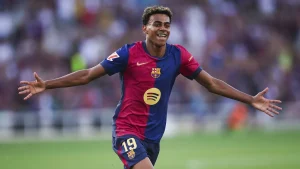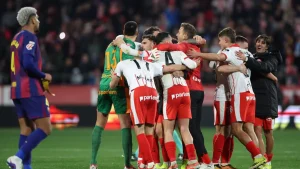Gerard Piqué’s Bizarre Davis Cup Takeover: When a Footballer Bought Tennis
Football has seen many unusual off-pitch stories, but few can match the bizarre move made by Gerard Piqué. Known globally as a World Cup-winning defender for Spain and a Barcelona legend, Piqué was admired for his defensive skills, leadership, and strong personality on the pitch. Yet in 2018, he took a step that no one could have predicted.
Instead of launching a football academy, starting a clothing brand, or simply investing in property like many other players, Piqué stunned the sports world by entering tennis. Not as a casual fan or ambassador, but as the man who would control the future of one of the sport’s oldest competitions, the Davis Cup. It was a business move that raised eyebrows across both football and tennis communities.
Piqué’s Bold Business Step
In 2018, while still playing for Barcelona, Piqué’s company Kosmos Holding signed a groundbreaking deal worth $3 billion with the International Tennis Federation (ITF). The agreement gave Kosmos the rights to run and completely revamp the Davis Cup, an international team tournament in tennis that had been around since 1900.
This deal instantly made Piqué not just a footballer but also a powerful figure in tennis administration. For decades, the Davis Cup was known for its traditional format, played over several months with home-and-away ties. Piqué wanted to change that, turning it into a World Cup-style event with a single tournament played over one week in one city.
Reaction From the Tennis World
As expected, this bizarre crossover did not sit well with everyone. Some tennis legends such as Roger Federer and Novak Djokovic openly questioned the decision. Critics asked why a footballer was being given the power to reshape a tournament that had nothing to do with his sport.
The idea of a week-long Davis Cup finals in Madrid received mixed reactions. Supporters argued that it would modernize tennis, attract new fans, and bring in more money. Opponents claimed that Piqué’s changes were too radical, stripping away the tradition and soul of the competition.
Despite the backlash, Piqué remained confident. He argued that his vision would benefit tennis in the long run and give the tournament more global appeal.
Balancing Football and Business
What made the story even stranger was that Piqué was still an active Barcelona player at the time. He had to balance La Liga matches, Champions League campaigns, and training sessions with high-profile business meetings and negotiations involving billions of dollars.
While most footballers spent their spare time relaxing or focusing on recovery, Piqué was sitting in boardrooms, convincing investors, and answering media questions about tennis. For a period, he was both a central defender at the Camp Nou and a key decision-maker in world tennis.
It was an unprecedented situation that highlighted Piqué’s entrepreneurial spirit but also raised questions about whether his focus was drifting away from football.
The Davis Cup Under Piqué’s Control
The first reformed Davis Cup finals under Piqué’s Kosmos took place in Madrid in 2019. Big stars like Rafael Nadal played in it, and Spain eventually won on home soil. From a business point of view, it was a success, bringing new sponsorships, media attention, and fans to the event.
However, challenges soon followed. Scheduling conflicts with the ATP Tour, player fatigue, and ongoing criticism about the format created difficulties. Some nations struggled with the travel demands, and the excitement began to fade after the initial buzz.
By 2023, the ITF announced it had cut ties with Kosmos, ending the deal earlier than expected. What began as a bold $3 billion vision turned into a short-lived experiment that divided opinion in the tennis world.
Why Did Piqué Do It?
The question many fans still ask is simple: why would a footballer like Piqué take over a tennis competition in the first place? The answer lies in his personality.
Piqué has always been more than a footballer. Known for his sharp business mind, he invested in various ventures during his playing career, from media production to eSports. He enjoyed exploring industries outside football and wanted to leave a mark beyond the pitch.
The Davis Cup project was his most ambitious move, showing his desire to be remembered as a global sports businessman as well as a footballer.
A Bizarre Legacy
Looking back, Piqué’s Davis Cup takeover remains one of the strangest stories in football history. While some athletes branch into music, fashion, or charity work, Piqué went straight into rewriting the rules of another sport.
Whether the project is judged as a failure or as a daring attempt at innovation depends on perspective. What is certain is that few fans will forget the time when a Barcelona defender was also the most powerful figure in international tennis.
Gerard Piqué’s takeover of the Davis Cup stands out as a bizarre and unique moment in sports history. It blurred the lines between football and tennis, challenged tradition, and showed how ambitious athletes can be beyond their main profession.
Even if the experiment did not last, it proved that Piqué was never afraid to take risks and dream big. And for fans, it remains a story that perfectly sums up the unpredictability of football’s biggest personalities.
FAQs
Q1. When did Gerard Piqué take over the Davis Cup?
Piqué’s company Kosmos signed a $3 billion deal with the International Tennis Federation in 2018.
Q2. Was Piqué still playing football when he bought the Davis Cup?
Yes, he was an active Barcelona player balancing both football and business responsibilities.
Q3. How did the tennis world react to Piqué’s takeover?
The reaction was mixed, with players like Roger Federer expressing concerns about changing the traditional format.
Q4. Did the new Davis Cup format succeed?
The first edition in 2019 had success, but over time scheduling conflicts and criticism made it difficult to sustain.
Q5. Is Piqué still in charge of the Davis Cup?
No, by 2023 the ITF ended its agreement with Kosmos, and Piqué no longer controls the competition.
















